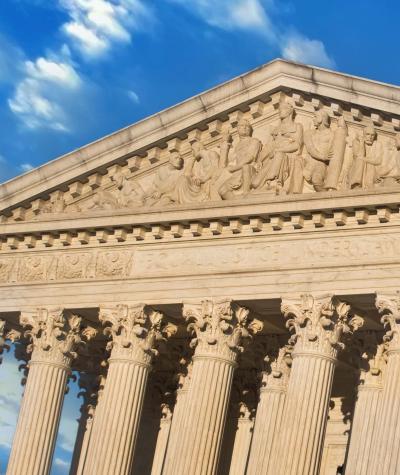The U.S. Supreme Court delivered a win for San Francisco voters by declining to accept a case brought by plaintiffs against a local campaign finance transparency law for further review.
This decision leaves in place disclosure requirements that will provide San Francisco voters with important information on who is spending money to influence their vote, a key step toward increasing transparency in elections.
San Francisco voters approved the disclosure law through a 2019 ballot initiative with a more than 75% majority. The law requires that certain campaign ads include a disclaimer listing the ad’s sponsor as well as the sponsor’s top three contributors and the dollar amounts of their respective contributions.
This transparency requirement ensures that city voters receive immediate information about who is financing the election messages they see (and thus, trying to influence their vote).
Another key element of San Francisco’s law that enables voters to fully understand who is funding political ads is its “secondary donor” requirement. If any of the top three contributors funding the ad sponsor are political committees, the sponsor is further required to list those committees’ top two contributors in the disclaimer.
“Trace back disclosure” laws like this are an important check on wealthy special interests who often spend vast sums of money to support their preferred candidates while hiding their involvement behind anonymous shell corporations and other spending entities.
In the age of unlimited election spending, laws must be designed to ensure all spenders reveal the sources of their funds and cannot hide behind dark money groups.
After San Francisco’s disclosure law was enacted in 2019, it was immediately challenged in successive cases in which the lower courts largely upheld the constitutionality of the law.
Upon appeal to the 9th Circuit, the plaintiffs argued that the disclaimer requirement unconstitutionally compels speech and does not provide the public with valuable information on who is funding campaigns
CLC weighed in on the case with a friend-of-the-court brief and defended the disclaimer requirement as an important transparency measure that protects voters’ right to know who is spending to influence our elections.
The Supreme Court’s refusal to take up this case leaves the 9th Circuit’s opinion in place and reaffirms why we need transparency in campaign finance: Voters in San Francisco deserve to know who is involved in their elections, and wealthy special interests should not be able to hide from the public behind a shell company or anonymous organization.
This perspective toward the importance of disclosure and transparency, which SCOTUS has consistently expressed in multiple rulings, is the foundation for many campaign finance laws being enacted and litigated across the country — including Prop 211 in Arizona.
Voted into law with a 72% majority in Arizona’s 2022 midterm elections, Prop 211 (also known as the Voters’ Right to Know Act) shines light on the original sources of secret spending (sometimes called “dark money” campaign contributions) in Arizona elections.
This law requires major spenders to disclose the original sources of large contributions bankrolling their campaign media spending, along with any intermediaries who passed money along from those major contributors.
The Act also requires major spenders to allow contributors to “opt-out” from having their contributions spent on campaign media.
In Arizona, San Francisco and plenty of other states and localities, transparency measures have won wide support from voters who want to see the bigger picture on who is spending money to influence public opinion and sway elections.
CLC is pleased that the Supreme Court has allowed San Francisco’s disclosure law to stand. Real transparency about who is spending big money on elections is critical for empowering local voters and curbing the power of wealthy special interests to secretly influence our elections.

